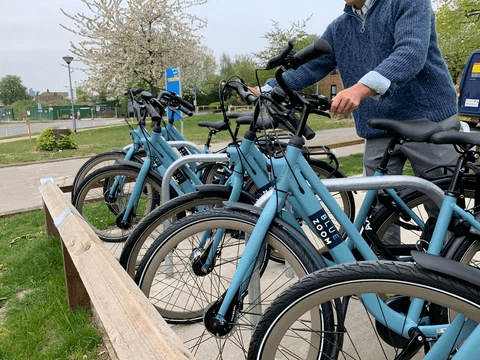
In What Way Are Companies, Including Bike And E-Scooter Providers, Delivering Critical Transport Solutions During The Pandemic?
In recent weeks, startups in Europe have been seemingly overcome by a wave of altruism. The entire spectrum of companies and industries, from start-up level to multi-national corporates have offered their products or services, often free of charge, to support front line organisations and surrounding communities. Blue Zoom has been contracted by a growing number of hospitals to provide fleets of bikes to help staff commute sustainably, healthily and at a safe distance. Meanwhile, many manufacturers have started developing an entirely new line of products to meet the surge in demand. The start-up Brewdog, for example, halted beer production entirely and began developing hand sanitizer whilst Tesla, GM and Ford are currently rapidly mass-producing ventilators in order to fill any shortages that may arise due to the coronavirus pandemic.

In the transport industry, operators are working in unison rather than in direct competition to support their local communities. Zeelo and Addison Lee have joined forces to provide safe transport and reliable logistics to support hospitals and critical factories whilst adhering to the social distancing rules. Meanwhile, many bike and e-scooter sharing and companies have altered their strategy to provide health care workers with free rides or extended trials. With bikes and electric scooters, riders have the flexibility to adapt their routes to ensure they avoid congested areas allowing them more control over contracting or sharing the disease. Unlike public transport, bike and e-scooter riders travel out in the open are and at 2m or more distance from one another naturally. An essential worker who is part of the A&E team at Croydon University Hospital and usually takes two buses as part of her commute, told The Independent: “I’m apprehensive about getting on a bus after I’ve been seeing coronavirus patients. It doesn’t really seem fair. Lots of people on the buses are elderly and frail – even now. I did feel uncomfortable using them,” she added.
As the NHS continues to deliver an exceptional service including providing life-saving treatment to one of the Blue Zoom team’s family members we are providing essential workers a critical transport option to reduce reliance upon cars and public transport. We are deploying and maintaining a growing number of employee mobility solutions at various NHS hospitals to provide workers a zero costs zero-emission alternative to public transport or driving. Here is one fleet at St George’s MT. Any NHS worker can rent a bike via our app for journeys from one hospital ward to the other or for multiple days at a time to commute to and from home.

One way any person can help to reduce risk of infection and therefore do their part to lower the risk of placing strain on the NHS is to strengthen our immune system through exercise. One of the best ways to do this is by exercising – ‘To be immunologically fit, you need to be physically fit’. Prof. Arne Akbar, president of the British Society for Immunology supports this saying White blood cells can be quite sedentary,” says Akbar. A further benefit to cycling that people often don’t think about is the boost to morale or wellbeing that provides the rider. One report by YMCA of 1000 adults indicated that cycling can help to make you 32% happier compared to those that lived an inactive lifestyle. With this in mind, providing employees access to bikes will help to relieve the likely stress staff are currently experiencing which will in turn enhance productivity.
Ultimately, it is warming seeing companies and communities working in unison to provide valuable solutions to where they are needed most. It has been a test for startups and corporates alike that has revealed their ability to pivot.


